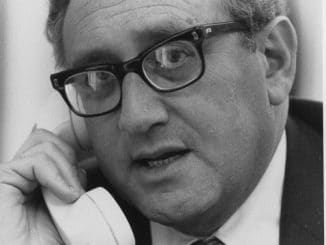Ölkrise wegen US Waffen an Israel
In response to the decision by the United States to resupply key weapons to Israel, on October 17, 1973, the 11 members of the Organization of Arab Petroleum Exporting Countries (OAPEC) announced an immediate cutback of oil production by 5 percent, to be followed by successive monthly cutbacks of 5 percent until Israel withdrew to the 1967 frontiers and the “legal rights” of the Palestinians were restored.
In a separate development, the six Persian Gulf members of the Organization of Petroleum Exporting Countries (OPEC) unilaterally increased the price of oil by 70 percent, from $3.01 to $5.12 a barrel.
Several countries, including Libya, Abu Dhabi, Kuwait, and Saudi Arabia either announced or threatened a total embargo against the United States.
As the Kuwaiti Minister of Oil and Finance, Abdul Rahman al-Atiqi, explained to the Ambassador to Kuwait, William A. Stoltzfus, the following day, the cumulative effect of the initial reduction of oil production of each OAPEC state was intended to result in a “complete embargo on oil to the United States” and to demonstrate that the Arab oil producers were serious “Front Line Fighters” in the war against Israel. (Telegram 3790; National Archives, Nixon Presidential Materials, NSC Files, Box 1175, Harold H. Saunders Files, Middle East Negotiations Files, 1973 Middle East War, October 18, 1973)
Secretary of State Henry Kissinger recalled that at the beginning of the Arab oil boycott, the Nixon administration believed the embargo was merely “a symbolic gesture of limited practical importance.” (Kissinger, Years of Upheaval, page 873)
CIA: Hauptlast der Ölkrise tragen Europa und Japan
According to a paper prepared in the Central Intelligence Agency on October 19, the effect of the oil embargo on the United States “would be relatively small, and after the first month, the brunt of the cutback would fall on Europe and Japan.”
Krise lieber jetzt als später
The CIA also believed that U.S. companies that produced most of the Middle East oil would be able to shift supplies among themselves to avoid the embargo. From the point of view of U.S. vulnerability, the CIA paper concluded: “it is perhaps fortunate that this particular crisis occurred now rather than a few years hence,” since by that time it was predicted that the United States would be importing nearly 5 million barrels per day of Arab oil or 21–22 percent of U.S. consumption. (Zur Ölkrise: Central Intelligence Agency, DI/OER Files, Job 80–T01315A, Box 36, Folder 2)
USA zahlen 2,2 Milliarden Dollar an Israel
After October 19, however, the crisis began to worsen when President Nixon asked the Congress for a $2.2 billion package of assistance to Israel to pay for equipment sent during the airlift (= die Luftbrücke zur militärischen Unterstützung Israels gegen Ägypten).
On October 23, Prince Fahd of Saudi Arabia sent Kissinger a backchannel message informing him that his country would maintain a total embargo on oil exports to the United States until Israel withdrew to its borders as they existed before the June 1967 war. (National Archives, Nixon Presidential Materials, NSC Files, Kissinger Office Files, Box 139, Country Files, Middle East, Saudi Arabia, Nov/Dec 1973)
Kissinger: Ölembargo nur psychologisch
In his memoirs, Kissinger maintained that “the true impact of the embargo was psychological” (Kissinger, Years of Upheaval, page 873), but the administration was determined to end it before the crisis spun out of control.
“We will break it,” he said at his staff meeting on October 23. “We will not provide auspices for the negotiations until they end it.”
Kissinger added: “We will not participate in any joint auspices until the oil boycott ends.” He concluded: “And also, we will start an emergency oil program in this country, which is more symbolic than substantive.” (National Archives, RG59, Transcripts of Secretary of State Kissinger’s Staff Meetings, 1973–77: Lot 78 D 443, Box 1, Secretary’s Staff Meetings)*89
Extensive documentation on the oil embargo and the U.S. response is in Foreign Relations, 1969–1976, volume XXXVI, Energy Crisis, 1969–1974.
Quelle: US State Department


